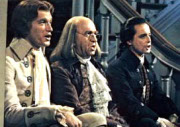[This post is participating in The Cooler’s Politics and Movies blog-a-thon.]
 I don’t know how my mom ever got me to watch the film 1776 in the first place. Probably it was by turning it on to watch it herself and relying on the hypnotic spell of the TV to pull me in. Ever since she did, I have spent a large part of my life trying — and failing, mostly — to persuade others to see it too. You see, the movie is almost impossible to describe without making it sound like “eat your vegetables” or “floss your teeth” or “do your homework” — something boring but essential because it’s good for you (shudder), even though it’s actually as entertaining a two hours as you’re ever likely to spend. Its educational value is just a nice little plus.
I don’t know how my mom ever got me to watch the film 1776 in the first place. Probably it was by turning it on to watch it herself and relying on the hypnotic spell of the TV to pull me in. Ever since she did, I have spent a large part of my life trying — and failing, mostly — to persuade others to see it too. You see, the movie is almost impossible to describe without making it sound like “eat your vegetables” or “floss your teeth” or “do your homework” — something boring but essential because it’s good for you (shudder), even though it’s actually as entertaining a two hours as you’re ever likely to spend. Its educational value is just a nice little plus.
Here, I’ll show you what I mean:
1776 is the true story of how the Second Continental Congress, which at first opposed the idea of separating from Great Britain, eventually came to adopt the Declaration of Independence. And it’s a musical!
See? You couldn’t possibly want less to watch it now, could you? The fact that it’s a musical only seems to confirm that it’s a subject so dreary that it needs some added flavor, like oatmeal. Let me try again:
In 1776, John Adams and Benjamin Franklin persuade a reluctant Thomas Jefferson to write the Declaration of Independence, and a reluctant Congress to adopt it.
Ugh, that’s worse. Try this on for size:
 Franklin.
Franklin.
 Jefferson.
Jefferson.
 Adams.
Adams.
They’re not just names in history books. They’re not just stodgy portraits, marble statues, or dry-as-dust lists of accomplishments. They were ordinary people like you and me. 1776 makes them accessible and shows how they achieved the impossible.
Oy. Clearly I’m trying too hard. Maybe if I concoct a modern high-impact movie trailer using scenes from the film and some dramatic narration…
NARRATOR
You know how it ends.
Close up on the new Declaration of
Independence as John Hancock adds his
distinctive signature.
HOPKINS
That's a pretty large signature,
Johnny.
HANCOCK
So Fat George in London can read
it without his glasses!
NARRATOR
But it almost didn't happen.
Congress in session.
RUTLEDGE
South Carolina will bury now and
forever your dream of
independence!
Congress in session.
ADAMS
They stopped our trade, seized our
ships, blockaded our ports, burned
our towns, and spilled our blood!
NARRATOR
In a world that doesn't know
freedom...
Congress in session.
DICKINSON
I have no objections at all to
being part of the greatest empire
on earth!
Congress in session.
RUTLEDGE
Black slavery is our peculiar
institution and a cherished way of
life.
NARRATOR
...a secret cabal...
Franklin indicates Jefferson, Adams, and
himself.
FRANKLIN
(singing)
A farmer, a lawyer, and a sage!
NARRATOR
...defies the mightiest army on
earth...
Congress in session.
THOMSON
(reading a dispatch)
"There can be no doubt that their
destination is New York for to
take and hold this city and the
Hudson Valley beyond would serve
to separate New England from the
other colonies permitting both
sections to be crushed in turn."
NARRATOR
...and an even greater enemy:
apathy...
Congress in session.
HANCOCK
(distractedly)
General Washington will continue
wording his dispatches as he sees
fit, and I'm sure we all pray that
he finds happier thoughts to
convey in the near --
(swats a fly)
-- future.
Outside Congress.
ADAMS
(singing to the heavens)
A second Flood, a simple famine,
Plagues of locusts everywhere
Or a cataclysmic earthquake
I'd accept with some despair
But no, you've sent us Congress!
Good God, sir, was that fair?
NARRATOR
...to attempt the impossible.
Franklin and Adams scheming outdoors.
FRANKLIN
No colony has ever broken from the
parent stem in the history of the
world!
NARRATOR
One man with a vision...
Congressional chamber, empty.
ADAMS
(singing)
I see fireworks!
I see the pageant and pomp and parade!
I hear the bells ringing out!
I hear the cannons roar!
I see Americans, all Americans
Free forevermore!
NARRATOR
...one man with a quill...
Jefferson appears at his window and lets
a paper flutter down to Adams and
Franklin in the street below.
ADAMS
Franklin, look! He's written
something -- he's done it!
(reads)
"Dear Mr. Adams: I am taking my
wife back to bed. Kindly go away.
Your obedient, T. Jefferson."
FRANKLIN
(admiringly)
What, again?!
NARRATOR
...and one man with the savvy to
see it through...
Congress in session.
FRANKLIN
We've spawned a new race here --
rougher, simpler, more violent,
more enterprising, and less
refined. We're a new nationality,
Mr. Dickinson. We require a new
nation.
NARRATOR
...must overcome incredible
odds...
Congress in session.
ADAMS
But it'll never be unanimous,
dammit!
DICKINSON
(pleased)
If you say so, Mr. Adams.
NARRATOR
...their personal prejudices...
Franklin and Adams scheming outdoors.
FRANKLIN
Nobody listens to you. You're
obnoxious and disliked.
Hopkins and Franklin milling about in
the Congressional chamber.
HOPKINS
You are without a doubt a rogue, a
rascal, a villain, a thief, a
scoundrel, and a mean, dirty,
stinking, sniveling, sneaking,
pimping, pocket-picking, thrice
double-damned, no good son of a
bitch.
Outside Congress.
JEFFERSON
(singing)
Oh, Mr. Adams, you are driving me
to homicide!
NARRATOR
...and their own weaknesses...
Adams and Jefferson in Jefferson's
apartment.
ADAMS
Do you mean to say it's not
finished?!
JEFFERSON
No, sir. I mean to say it's not
begun.
Adams and his wife.
ADAMS
I've always been dissatisfied, I
know that. But lately I find that
I reek of discontentment. It
fills my throat and floods my
brain.
Franklin and Adams in Congress.
FRANKLIN
What will posterity think we
were -- demigods?
NARRATOR
...to prove to the world...
Congress in session.
ADAMS
Certainly we require the aid of a
powerful nation like France or
Spain.
Congress in session.
DICKINSON
Mr. Jefferson, are you seriously
suggesting that we publish a paper
declaring to all the world that an
illegal rebellion is, in reality,
a legal one?
NARRATOR
...that all men...
Adams and Franklin in the Congressional
chamber.
FRANKLIN
Whether you like it or not, they
and the people they represent will
be a part of the new country you'd
hope to create! Either start
learning how to live with them or
pack up and go home!
NARRATOR
...are created equal.
Congress in session.
FRANKLIN
There's no backing out now. If we
don't hang together, we shall most
assuredly hang separately!
Laughter.
HANCOCK
Gentlemen, forgive me if I don't
join in the merriment, but if
we're arrested now, my name is
still the only one on the damn
thing!
 I don’t know how my mom ever got me to watch the film 1776 in the first place. Probably it was by turning it on to watch it herself and relying on the hypnotic spell of the TV to pull me in. Ever since she did, I have spent a large part of my life trying — and failing, mostly — to persuade others to see it too. You see, the movie is almost impossible to describe without making it sound like “eat your vegetables” or “floss your teeth” or “do your homework” — something boring but essential because it’s good for you (shudder), even though it’s actually as entertaining a two hours as you’re ever likely to spend. Its educational value is just a nice little plus.
I don’t know how my mom ever got me to watch the film 1776 in the first place. Probably it was by turning it on to watch it herself and relying on the hypnotic spell of the TV to pull me in. Ever since she did, I have spent a large part of my life trying — and failing, mostly — to persuade others to see it too. You see, the movie is almost impossible to describe without making it sound like “eat your vegetables” or “floss your teeth” or “do your homework” — something boring but essential because it’s good for you (shudder), even though it’s actually as entertaining a two hours as you’re ever likely to spend. Its educational value is just a nice little plus. Franklin.
Franklin. Jefferson.
Jefferson. Adams.
Adams.